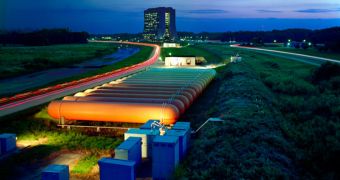The United States will most likely enjoy the benefits of housing the second-most powerful particle accelerator in the world for another three years, say a group of physicists that recently made the recommendation.
The panel was to decide whether to propose an extension to the Tevatron program, or if they should recommend it be shut down. The experts say that the collider can be kept online for another 3 years.
The decision the group took will now go to the US Department of Energy (DOE) as a proposal. The Department operates the Fermi National Accelerator Laboratory (Fermilab), which houses the Tevatron.
From the DOE, the proposal will go to Congress and then to the White House. If approved in all these instances, then the particle accelerator, second only to the Large Hadron Collider, will not be shut down.
Deciding on whether to award Fermilab with the funds it needs to operate the Tevatron could mean deciding who finds the Higgs boson first. This elementary particle is the reason the LHC exists.
Experts operating the Tevatron say that it is theoretically possible to discover this boson in the United States, but add that the LHC will surely find it first if a funding extension is not awarded to the American accelerator.
But hopes are high that the DOE, Congress and Obama will approve the $105 million needed for the funding, given that this is a relatively small amount of money compared to the $10 billion it took for Europe to build the LHC.
Experimental physicist Robert Roser says that the time for the US to discover the Higgs is now. The LHC started operating a year later than planned, and is also scheduled to be shut down in December 2011.
It will remain closed for more than a year, until engineers at the European Organization for Nuclear Research (CERN) change faulty superconducting magnets at the accelerator, Wired reports.
Until it closed, the LHC runs at just half its top energy, Roser adds, which means that the Tevatron does stand a chance of finding the Higgs boson first, provided that funding continues.
“Now it’s up those people [at the DOE] to work together to figure out how to get $35 million per year out of the budget,” Roser explains of the financial hardships ahead.
“With a $4.7 billion total [DOE] Office of Science budget, I’m hoping it won’t be that hard. But we’ll see,” he concludes.

 14 DAY TRIAL //
14 DAY TRIAL //